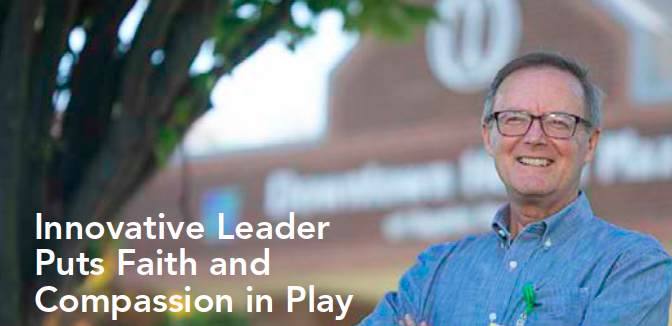By Les Gura
Robert Jones speaks softly, in the gentle Southern accent of his native Scotland County, North Carolina. Behind that quiet voice, though, lies a powerful life purpose. And a mighty pen.
Jones, PhD, is director of the Downtown Health Plaza (DHP), a center that serves the underinsured and uninsured in Winston-Salem. Beyond the 11 years at DHP, Jones has spent four decades fighting for people who often don’t have or can’t access proper health care. “Robert is a very unassuming individual,” says Karen Gerancher, MD, residency program director of Obstetrics and Gynecology at Wake Forest Baptist Health, which operates the DHP. “He does not walk around saying ‘Look at what I’ve done.’
“You obtain knowledge of what he’s done by experiencing it. All of a sudden one day, there’s access to something for our patients that has not been here before. Well, Robert wrote a grant.”
An Early Calling
When Jones was 10, a pharmacy sent a delivery boy who was African-American to his home to bring medication for his grandmother. The delivery boy was hot and tired after a long bicycle ride and so Jones grabbed some allowance money, ran up the street after him and told the youth his grandmother had forgotten to give him a proper tip.
Over the years, he accepted this social justice component of his personality and its influence on his life.
 While attending the University of North Carolina – Wilmington, he traveled to Ecuador with 11 fellow students to collect vampire bats for a Smithsonian Institution project on food insecurity. The research was studying how an insect on the bat would infect the cattle population. After graduation, he joined the Journeyman program through the Southern Baptist church he’d grown up in, working with a physician in Honduras—where he became fluent in Spanish—to provide clinics in remote locations.
While attending the University of North Carolina – Wilmington, he traveled to Ecuador with 11 fellow students to collect vampire bats for a Smithsonian Institution project on food insecurity. The research was studying how an insect on the bat would infect the cattle population. After graduation, he joined the Journeyman program through the Southern Baptist church he’d grown up in, working with a physician in Honduras—where he became fluent in Spanish—to provide clinics in remote locations.
“I realized while doing that work for two years that I had some gifts I wasn’t aware of that would help me address hunger issues in the world. I was very idealistic; I still am. I thought it would wear off with age, but it hasn’t happened,” he says, eyes twinkling behind gold wireframe glasses.
He came home to obtain a PhD in nutrition from Mississippi State University, and then took a job to address hunger and malnutrition in poverty-stricken Senegal. His job was to persuade villagers to make changes in their dietary habits, not an easy thing to do in a place where custom ruled. For example, even though chickens were everywhere in his main community and provided small brown eggs that could provide life-saving protein to children infected with parasites, the eggs were shunned by parents. The Senegalese believed children who ate the eggs would grow up to be thieves, Jones says.
He traveled to another village 30 miles south, where he found large white eggs and brought them back to his community, telling the villagers, “Today, I’m going to give you these eggs. You’ve never seen eggs like these, and if your child eats them, they will not be a thief.”
Bringing Ideas Home
Jones returned to the U.S. in 1992, looking to take advantage of his bilingual skills. His wife had graduated from Wake Forest University and the couple happily moved to North Carolina when Jones was offered a job as nutritionist with the Women, Infants and Children (WIC) program in Forsyth County, North Carolina.
He later became assistant health director for preventive health for the county, and in 2000 joined the county-run Reynolds Health Center in Winston-Salem, the predecessor to the DHP. Center Director Michael Clements says Jones “understood how to deal with folks in a way that would get the best outcome.”
 And so Jones got to work writing grant applications and running day-to-day operations. Soon after, Reynolds Health Center came under full control of Wake Forest Baptist, which built the Downtown Health Plaza to replace Reynolds. When Clements left in 2007, Jones succeeded him.
And so Jones got to work writing grant applications and running day-to-day operations. Soon after, Reynolds Health Center came under full control of Wake Forest Baptist, which built the Downtown Health Plaza to replace Reynolds. When Clements left in 2007, Jones succeeded him.
Despite operating $1 million in the red annually, the DHP under Jones’ leadership has enacted many innovative programs, including:
- Centering Pregnancy, which provides prenatal education and care to expectant moms and encourages breastfeeding as a way to reduce post-partum issues for mother and child.
- The introduction of a behavioral health specialist in many DHP clinics so that patients with anxiety, depression or other mental health issues can be seen by a professional at the same time they have their medical appointment.
- A community garden that has vastly grown over the past 10 years and offers free fresh vegetables to patients and their families.
- Free or reduced-cost transportation to the DHP through a variety of sources for any patient who needs a ride.
Gerancher, the residency program director, says the behavioral health program alone has been a godsend for physicians and patients.
“I don’t know what word to use to say how important it is. Patients in poor mental health situations that aren’t addressed have poorer physical health,” she says. “The patients probably didn’t see themselves as having access to those resources. The fact that they didn’t have to ask and it was there—especially for those who don’t have English as a native language—is huge.”
Community and Dignity
It is easy for people to write off care for the poor.
Clements says when he arrived at the Reynolds Health Center in 1996, it took him two to three years to bring about a philosophical change on the part of staff and administrators. “The provision of health care services to anyone should be done with a certain level of respect and a certain level of dignity,” Clements says. He says Jones not only was on board with that philosophy, but worked to instill it as a way of life for DHP.
That doesn’t mean it’s easy.
Jones says one of the more difficult parts of his job is persuading financial administrators of the hidden value behind the emphasis of nearly every program at DHP, which is preventive care. He uses varied approaches, but says he is most successful when administrators who might not be aware of the challenges facing the underserved population take the time to visit. At DHP, they see firsthand the work of the medical staff and support team, as well as how patients are treated.
“What we do is we are very in touch with the population we serve and we look for a way to improve their outcomes. We can say that we prevent some more serious problems,” Jones says.
Jones’ faith and belief shines through in the anecdotes he shares about DHP and its patients.
 There was a man living in an apartment complex who Jones noticed on a Medicaid report had gone to the emergency department six times in three months by ambulance—a very expensive proposition. It turns out the man had a leg problem and didn’t feel he could walk to the DHP. Jones spoke with him about the expense of going to the ED and soon the man was instead using bus passes the DHP provided to get to his appointments. “He loved that; he said he’d much rather come here.”
There was a man living in an apartment complex who Jones noticed on a Medicaid report had gone to the emergency department six times in three months by ambulance—a very expensive proposition. It turns out the man had a leg problem and didn’t feel he could walk to the DHP. Jones spoke with him about the expense of going to the ED and soon the man was instead using bus passes the DHP provided to get to his appointments. “He loved that; he said he’d much rather come here.”
There was a woman who burst into tears at her medical appointment because her son had been killed in a drive-by shooting. It turns out she had borrowed money to pay for his funeral and because of that had not paid her rent and was being evicted. After being calmed by her behavioral health provider at DHP, the entire care team, which included a patient navigator, helped get the eviction stopped to give the patient more time to figure out what to do. “We’re not just saying, ‘Well, here’s your prescription I hope it all goes well,’” Jones says. “We’re going to listen to your story and we’ve got ways to assure that your needs are met so that you can take care of yourself better.”
Commitment to Faith
Jones says his work is about faith and spirituality. “The community we serve has a very faith-centric approach to life,” he says. “So if you’re serving people who have that view of the world, you have to meet people where they are.”
One of the programs he has brought to DHP, Care Plus, offers a team of providers including a Clinical Pastoral Education resident, to support patients combatting chronic medical problems such as hypertension, diabetes and obesity.
The team’s work includes understanding outside issues affecting patients’ lives and helping to find solutions there, too, whether those problems involve transportation, housing, food or something else. The approach is a duplicate of the FaithHealth Supporters of Health program at Wake Forest Baptist.
Not surprisingly, Jones is a fan of the Division of FaithHealth and its understated efforts to bring compassionate care to underserved populations. Jones says that throughout his life, in every country where he has worked and with people of any socioeconomic status, a sense of community is most present when people have compassion. “The other day a former patient sent us $100. She said, ‘You helped me when I didn’t have anything. I want to give back.’”
Clements knows his former colleague and longtime friend has the faith and sense of community necessary of effective leaders.
“The attitude he brings, a belief in the human condition—and what to do and how to react to that—is outstanding,” Clements says. “We need a lot more Robert Joneses in the world.”

